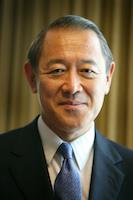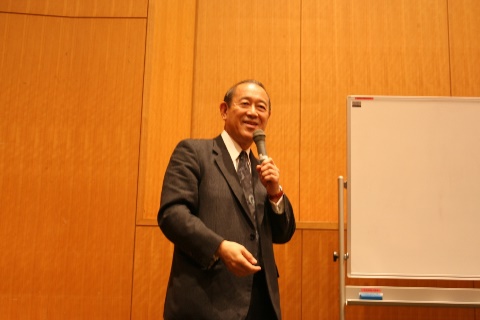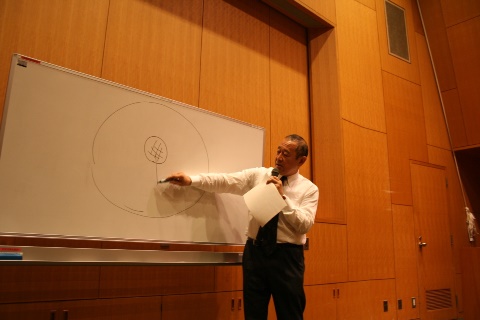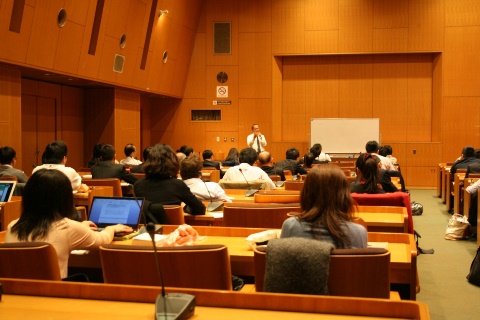The 75th Public Policy Seminar
The Way of Observing the International Affairs
By Ichiro Fujisaki, President, the America-Japan Society, Inc.
(Former Japanese Ambassador to the United States of America)

Mr. Fujisaki, an experienced diplomat and former Japanese ambassador to the US, will show how to look at the international affairs to aspiring global leaders.
| Date & Time | Thursday, November 21, 16:30-18:00 |
|---|---|
| Venue | 2F Conference Room, Sanjo Conference Hall MAP |
| Language | English |
第75回公共政策セミナー
『国際情勢の見方』
講師 一般社団法人 日米協会会長 藤﨑 一郎氏

駐米大使をはじめ、外交官として数々の要職を歴任された藤﨑一郎氏に「国際情勢の見方」について、将来のグローバルリーダーを目指す日本人及び留学生に、英語でご講演いただきます。
| 【日時】 | 2013年11月21日(木)16:30-18:00 |
|---|---|
| 【場所】 | 山上会館 大会議室 MAP |
| 【言語】 | 英語(同時通訳なし) |
Summary
Grasping people's mind to understand international issues
With 40-year experience dealing with international relations, Mr. Fujisaki directly sent the main message to the audience at the University of Tokyo: in order to read the international issues, the most important thing is not to merely apply political theory but to grasp the psychology of people's mind.

Mr. Fujisaki took two examples of North Korea and China to illustrate the idea. “Regarding North Korea, many people say it is a difficult country to understand, but it is not true,” he stated, “everyone knows that it is one of the easiest ones to predict”.
The argument went one as following: In an inheritance system when all wealth centers in a small group, the leaders basically have several choices: (1) to give out the wealth to people to distribute evenly; (2) to open up the country; and (3) to just go on.
With the first option, some people would be grateful, at the same time there will be strong resistance among the small group, plus there is not enough to distribute. The second choice may lead the people in the North Korea to feel that they have been totally deceived for many years by their leaders about the fact that the South Korea had been developing far more than them, and they will not be happy. The last option is just to go on without much change. Which do you choose? (Most of the audience chose the third option.) He continued, "So, as I told you, you already know the answer." He then went on to explain his theme using security environment. Same results were brought about.

Turning our eyes to the question of China, the remark about psychology makes a lot sense as well. Ideologically, in a communism society all have equal results whereas in the capitalism, all have equal opportunities. Deng Xiaoping introduced the theory that some of the Chinese could go first beyond the others, and then the others can follow. But this does not work well. Unlike the story of hare and tortoise in which the hare takes a long rest and comes later than the tortoise, in reality, if you go fast, then you will tend to go even faster without taking rest. The question in China now is the wider and wider gap among their people.
The psychological question here is: people are not happy just because they eat better than last year, they will not be happy when looking at the others who are eating better than they are. Although the leaders are highlighting on fighting corruption, the fact is that people are angry with the system itself. When the bureaucrats are not checked by media, by elected officials or by people, they can go wrong so badly.
“Some say that there are conservatives or reformists in Chinese Communist Party. I think it is exaggerated,” Mr. Fujisaki claimed, “I think that all of them are of the view which is to maintain the system. At the very end, none of them would like change the one party rule”.
“Whenever we look at a document or a political commitment, instead of trusting it right away, try to read it with its background. If you read too much speeches or documents without bearing in mind the context, you may rely too much on what one said or wrote,” concluded Mr. Fujisaki.
